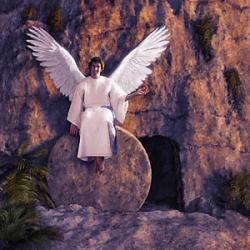"I'm sorry?" Katherine was still gazing down at him.
"Elohim," he repeated. "The Hebrew word for God in the Old Testament! I've always wondered about it."
Katherine gave a knowing smile. "Yes. The word is plural.
Exactly! Langdon had never understood why the very first passages of the Bible referred to God as a pluralbeing. Elohim. The Almighty God in Genesis was described not as One . . . but as Many.
"God is plural," Katherine whispered, "because the minds of man are plural" (pp. 504-505).
On this subject, President Joseph Fielding Smith wrote:
It is perfectly true, as recorded in the Pearl of Great Price and in the Bible, that to us there is but one God. Correctly interpreted God in this sense means Godhead, for it is composed of Father, Son, and Holy Spirit. This Godhead presides over us, and to us, the inhabitants of this world, they constitute the only God, or Godhead. There is none other besides them. (1 Corinthians 8:5-6.) To them we are amenable, and subject to their authority, and there is no other Godhead unto whom we are subject. However, as the Prophet has shown, there can be, and are, other Gods.
Have we overlooked the fact that the scriptures, ancient and modern, hold out the promise to all those who are faithful and true to every covenant and obligation which the gospel places upon them that the reward will be that they shall become gods? Jesus taught this doctrine to the Jews. It is interwoven throughout all of our Standard Works. The promise has been made to all who are just and true, that they shall become sons and daughters of God, members of his household, (Ephesians 3: 14-15) "joint heirs with Jesus Christ," (Romans 8:17) and entitled to the fulness of exaltation.
Then shall they be gods, because they have no end; therefore shall they be from everlasting to everlasting, because they continue; then shall they be above all, because all things are subject unto them. Then shall they be gods, because they have all power, and the angels are subject unto them. (D&C 132:20)[16]
After having read The Lost Symbol, I've recognized that much of my study and interest bears upon some of the same subjects as the novel, namely Noetics, quantum mechanics, the power of the mind, enlightenment, and hidden secrets in the world. Some of my paper almost reads as an extension of one of Katherine's or Peter's sermons from the book.
There will be much more to discuss about Dan Brown's latest book. Do you have any insights about The Lost Symbol you'd like to share? Please discuss with us in the comments.
This article was first published at TempleStudy.com and is reprinted with permission.
Bryce Haymond is a student of the work of recognized LDS scholar Dr.Hugh Nibley, and in January 2008 launched the apologetic LDS temple website TempleStudy.com. As a Brigham Young University graduate, Bryce currently works as a Design Manager and lives in Pleasant Grove, Utah, with his wife and two children.




